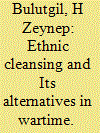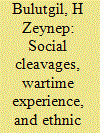|
|
|
Sort Order |
|
|
|
Items / Page
|
|
|
|
|
|
|
| Srl | Item |
| 1 |
ID:
152919


|
|
|
|
|
| Summary/Abstract |
According to the extant literature, state leaders pursue mass ethnic violence against minority groups in wartime if they believe that those groups are collaborating with an enemy. Treating the wartime leadership of a combatant state as a coherent unit, however, is misleading. Even in war, leaders differ in the degree to which they prioritize goals such as maintaining or expanding the territory of the state, and on whether they believe that minority collaboration with the enemy influences their ability to achieve those goals. Also, how leaders react to wartime threats from minority groups depends largely on the role that political organizations based on non-ethnic cleavages play in society. Depending on those cleavages, wartime minority collaboration may result in limited deportations and killings, ethnic cleansing, or minimal violence. A comparison of the policies of three multinational empires toward ethnic minority collaborators during World War I—the Austro-Hungarian Empire and Italians, the Ottoman Empire and Armenians, and the Russian Empire and Muslims in the South Caucasus—illustrates this finding.
|
|
|
|
|
|
|
|
|
|
|
|
|
|
|
|
| 2 |
ID:
141227


|
|
|
|
|
| Summary/Abstract |
What explains ethnic cleansing? Recent research has used systematic evidence to explore the causes of civilian victimization and mass killings. Yet, comparable studies that focus on ethnic cleansing are still rare. This article conceptualizes ethnic cleansing as a group-level phenomenon that is distinct from civilian victimization or mass killings and studies its causes by using systematic evidence from Europe 1900–2000. The article makes two theoretical moves. First, it highlights the salience of non-ethnic cleavages such as social class as a background condition that has the ability to hinder ethnic cleansing. Second, it distinguishes between two causal mechanisms, one that considers wars as ‘strategic environments’ and the other as ‘transformative experiences’, that relate to the proximate causes of ethnic cleansing. Using original data from 20th-century Europe, the empirical analysis offers two main findings. First, it shows that salient social cleavages, measured through levels of land inequality, political competition, and support for left-wing parties, substantially decrease the risk of ethnic cleansing. Second, the analysis suggests that the arguments that underscore psychological mechanisms related to wartime experiences provide a better explanation for ethnic cleansing than the arguments that emphasize the role of strategic wartime aims. This finding is further supported by a brief discussion of key cases in which both causal mechanisms predict ethnic cleansing. The results highlight the importance of treating ethnic cleansing as a conceptually separate phenomenon and offer implications for the debate on democracy and mass ethnic violence.
|
|
|
|
|
|
|
|
|
|
|
|
|
|
|
|
|
|
|
|
|